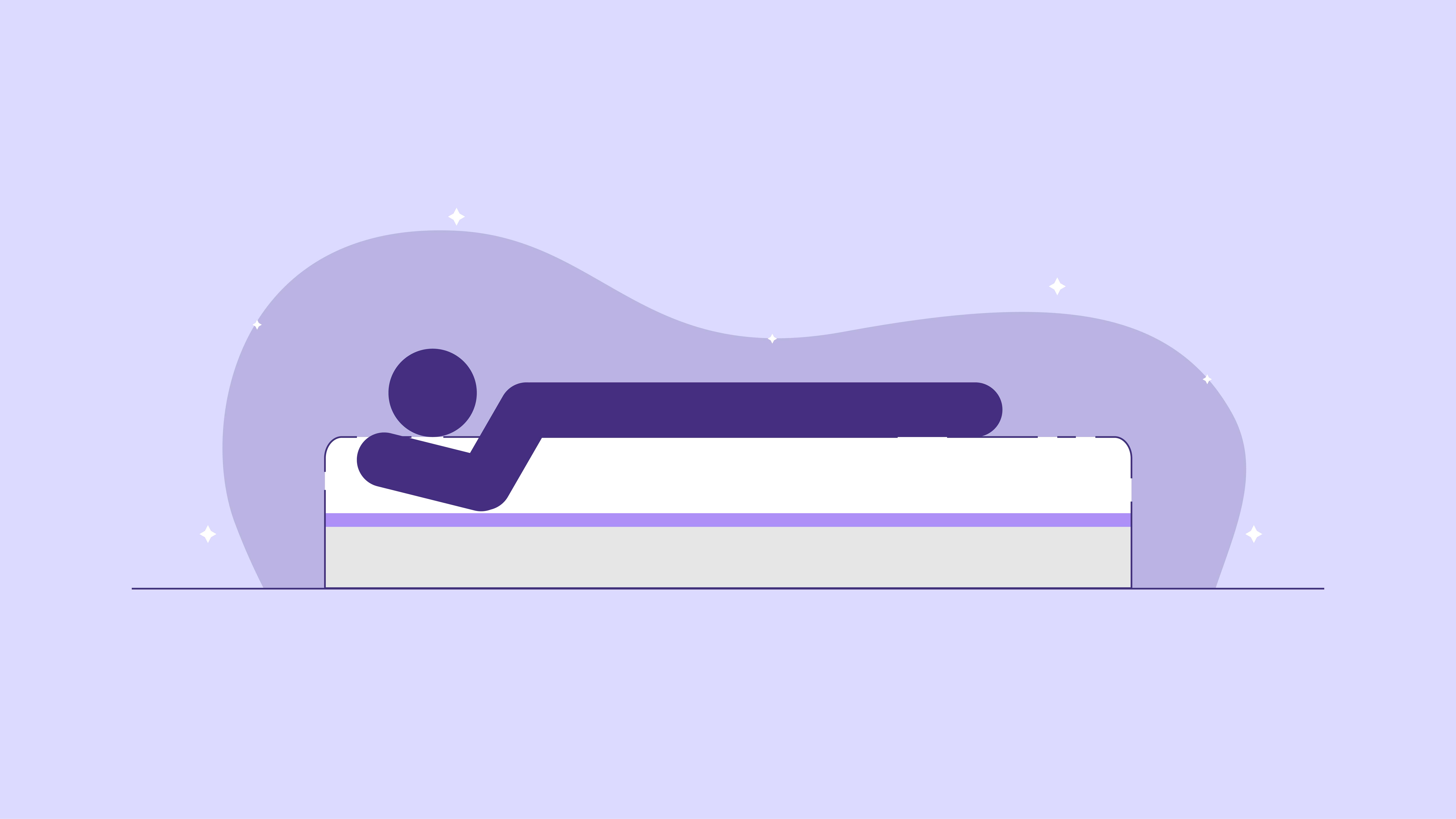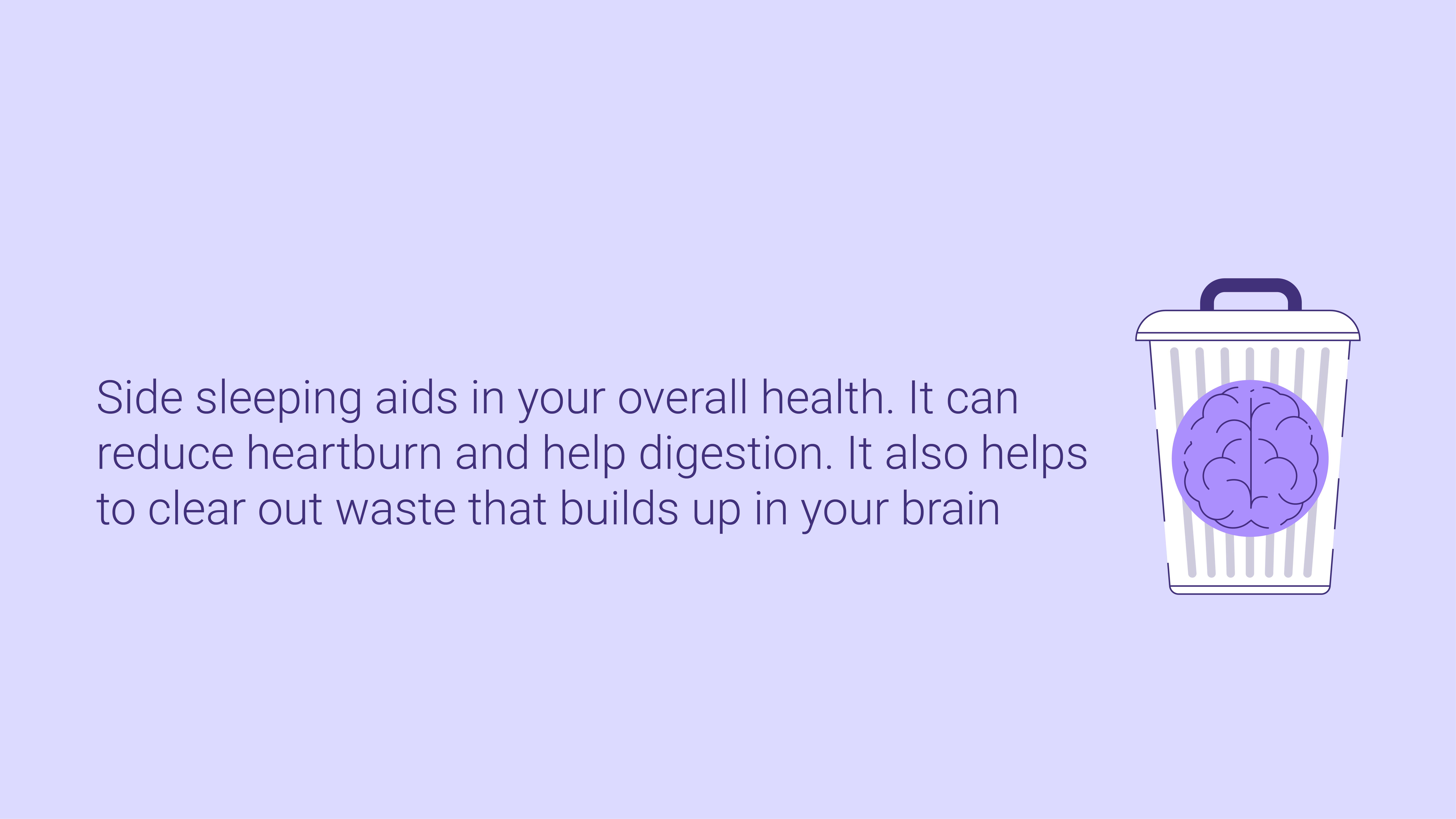
Is Sleeping on Your Stomach Bad?
Dr. Jennifer Miller, PT, DPT: Expert Physical Therapist and Pelvic Health Specialist
Dr. Jennifer Miller is a compassionate and skilled outpatient physical therapist with nine years of experience in the field. She earned her Doctor of Physical Therapy from Elon University and holds a Bachelor of Science in Health Science from Minnesota State University-Mankato. Dr. Miller specializes in Neurological, Geriatric, and Vestibular Physical Therapy and serves as […]
In a word, yes. Sleeping on your stomach is not recommended because it could cause health issues down the line. Sharp pain in your neck, spine, and shoulders should be enough to deter the seven percent of people who sleep on their stomach—yet, there’s still a small fraction of sleepers who prefer to snooze this way.
When sleeping on your stomach, your neck and spine are not in a neutral position. As a result, there is unnatural pressure on your neck and spine. Turn your head to the left or the right and feel the slight tension in your neck. Now imagine doing that for hours at a time….every single night. (It’s no surprise most people avoid sleeping on their stomach!)
While some argue that sleeping on your stomach reduces snoring, it puts pressure on your muscles and joints because your body is in an unnatural position. That pressure causes joint pain that can end up causing poor sleep. Ultimately, stomach sleepers are not getting the most restful sleep out there, and if you’re a stomach sleeper, you should look to change your sleeping position to avoid chronic back and neck pains.
In our post, we discuss in more detail exactly why stomach sleeping is so unhealthy and run through tips for switching to side or back sleeping.
1. Stomach Sleeping Places Pressure On the Spine
When sleeping on your stomach, your center of gravity shifts to your midsection and this pulls your belly into the mattress and places extra pressure on the spine. As the night goes on, your stomach continues to sink and the lower back continues to arch, causing pain and discomfort.
Due to your spine’s placement and connection with the rest of your body, it’s incredibly important to protect it while you sleep. Not doing so can lead to back issues which can cause numbness and tingling.
The spine is home to your nervous system, and added pressure on it can lead to pain throughout your body. The pressure also increases wear on the cartilage between joints. In the long term, this causes more pain as the cartilage begins to wear down. Avoiding chronic back pain is an obvious choice, which means you should avoid sleeping on your stomach.
2. Sleeping Flat Causes Neck and Shoulder Pain
Sleeping on your stomach can cause neck pain from twisting your head to the side in order to breathe. Shoulder pain with stomach sleepers usually stems from the belly sinking in due to the unnatural positioning of your body. To make matters worse for stomach sleepers, a thicker pillow can cause you to crane your neck, resulting in more neck and shoulder pain.
When sleeping on your stomach, it’s impossible to breathe properly if you leave your head in a natural position on your pillow. People obviously can’t breathe through their pillows, so they turn their heads as a result. This unnatural position will create pain in your neck. From there, the dominos will fall, and the muscles in your shoulders will also experience discomfort.
Long-term stomach sleeping can have long-term consequences. One of these potentially harmful consequences is a herniated disc. These can result in numbness in the leg or arms and might require surgery to fix.
3. It’s Also Potentially Dangerous for Pregnant Women and Babies
Stomach sleeping while pregnant is not only uncomfortable, but it can also exacerbate the aches and pains that pregnant moms are already dealing with as their bellies grow and bodies change. Sleeping on your stomach can be especially dangerous for pregnant women, not to mention incredibly uncomfortable. Pregnant women often have back pain which stems from their continually-expanding bellies. Stomach sleeping often causes lower back pain, and it would be advisable to avoid compounding those issues. One way to combat this is to use a pregnancy pillow to encourage positive sleeping habits. The C-shaped body pillow works to prevent pregnant women from rolling onto their stomachs in the middle of the night.
Dr. Jennifer Miller, Physical Therapist, advises, “I highly encourage using a C-shaped pillow for my pregnant patients. I utilized one during my pregnancy and it made sleep more comfortable and attainable.”
Newborn babies should never be placed on their stomachs. Babies cannot initially move in bed on their own, so it’s important that parents place them in their cribs on their backs. By placing them on their backs, parents are ensuring that babies can breathe easily throughout the night. Finally, putting infants on their stomachs puts them at a much higher risk of Sudden Death Infant Syndrome, also known as SIDS.
Tips for Stopping Stomach Sleeping
- Buy a body pillow to keep yourself propped up on your side.
- Use a knee pillow while side sleeping to prevent yourself from rolling onto your belly.
- Use a wedge pillow while back sleeping to keep yourself lying flat. (Sleeping on your stomach at an angle is incredibly uncomfortable, anyway.)
- Invest in an adjustable bed frame and keep it at a more extreme incline than a wedge pillow, as this makes stomach sleeping even more difficult and uncomfortable to manage.
- Place a pillow under your knees when sleeping on your back, as it reduces stress in the low back and can be more comfortable.
Other Types of Sleeping Positions
There are plenty of different sleep positions to consider when sleeping besides on your stomach. The majority of them fall under two different categories: side sleeping and back sleeping. These are the best sleep positions since they’re considered to be the healthiest and safest for most people.
Side Sleeping

Side sleeping is the most popular sleep position. Sleeping on your side encourages you to keep your head in a neutral position. While this doesn’t always happen, it’s fairly easy to fix. You want to keep your head even with shoulders. This should feel similar to when you’re standing up properly.
Side sleeping aids in your overall health. Properly sleeping on your side can reduce heartburn and help digestion. It also helps to clear out waste that builds up in your brain. By removing the waste in your brain, you can lower the risk of neurological diseases, including Alzheimer’s and Parkinson’s disease. Side sleeping also makes you less susceptible to snoring and sleep apnea, as it reduces the pressure on your airways and keeps your tongue in the proper position.
While side sleepers can end up in the fetal position, they’re likely to have better sleep quality than stomach sleepers. There’s less pressure on their lower abdomen, which means they are closer to the proper position, resulting in better sleep.
Back Sleeping
Back sleeping, which is also quite popular, is another good choice for your sleeping posture. Back sleeping balances a person’s weight, making them more comfortable because you are in a more natural position. On top of that, a neutral position avoids unnecessary pressure on your neck and back. Back sleeping also maintains the natural curve of your spine, which is not only healthier but also more comfortable.
Some people avoid back sleeping for two reasons: One, it worsens sleep apnea symptoms and makes it harder to breathe in those who have this sleep disorder. And two, it can lead to snoring.
Common Questions
What is the best sleeping position?
Back and side sleeping are considered the best sleeping positions since they don’t put a strain on the spine, and instead, offer health benefits. Sleeping on your back is good for those with back pain because it allows for even distribution of body weight and reduces pressure on the joints. However, back sleeping isn’t recommended for those with sleep apnea, acid reflux, or those who snore because it can exacerbate symptoms. Instead, side sleeping is better. Side sleeping allows for easier breathing since there is less pressure on the airways. It’s also better for pregnant women, especially sleeping on your left side, since it reduces pressure in the womb.
Does sleeping on your stomach cause stomach pain?
Stomach sleeping is known to cause back and neck pains, and it may even cause an upset belly in some sleepers because it can exacerbate stomach issues like indigestion. Stomach sleeping can also cause stomach pain if you’ve eaten a large amount before going to sleep. While there isn’t any evidence to suggest it will cause new stomach issues, sleeping on your belly could worsen previous problems.
How do I stop sleeping on my stomach?
If you’re ready to make the switch from stomach sleeping to another sleep position, we suggest investing in a body pillow to keep yourself propped in your desired sleep position. These are perfect for side sleeping, because they relieve unnecessary pressure, support your body throughout the night, and can even help reduce snoring. Body pillows work for back sleeping because they can help form a barrier and keep you on your back. In addition to body pillows, back sleepers may want to use a wedge pillow to keep them resting at an incline and make it harder to roll onto the belly. Dr. Miller suggests, “I encourage my patients to start the night by sleeping on their back or side, as they’re more likely to revert back to old habits throughout the night. They will slowly build up a tolerance to the new sleeping position and adding body pillows, as previously discussed, can help reduce the tendency to roll onto their stomach. Changing one seemingly simple thing, like sleep position, can have a tremendous impact on reducing back pain.”
What can I do to reduce pain from sleeping on my stomach?
The first thing you should do is work towards not sleeping on your stomach. You can use a pillow under your hips to help reduce the pain of stomach sleeping. Another way to reduce pain associated with stomach sleeping is to stretch before and after you sleep.
Is sleeping on your stomach bad for your face?
Sleeping on your stomach can cause wrinkles and sagging skin, but apart from expediting the aging process, sleeping on the stomach doesn’t affect your skin much. The best sleeping position to maintain your skin’s youthful appearance is back sleeping since your face is not pressed against the pillow while lying flat on your back.
Conclusion
Stomach sleeping isn’t the best position for sleeping. There’s a reason only 7 percent of people do it: it often leads to long-term pain and health problems. If you currently sleep on your stomach, your best option is to work towards sleeping in other positions. A slight change in how you sleep might reduce pain and soreness. You also want to make sure to have the best mattress and best pillow for support when looking for a new sleeping position. This will help you find a better night’s rest as you move away from sleeping on your stomach.
